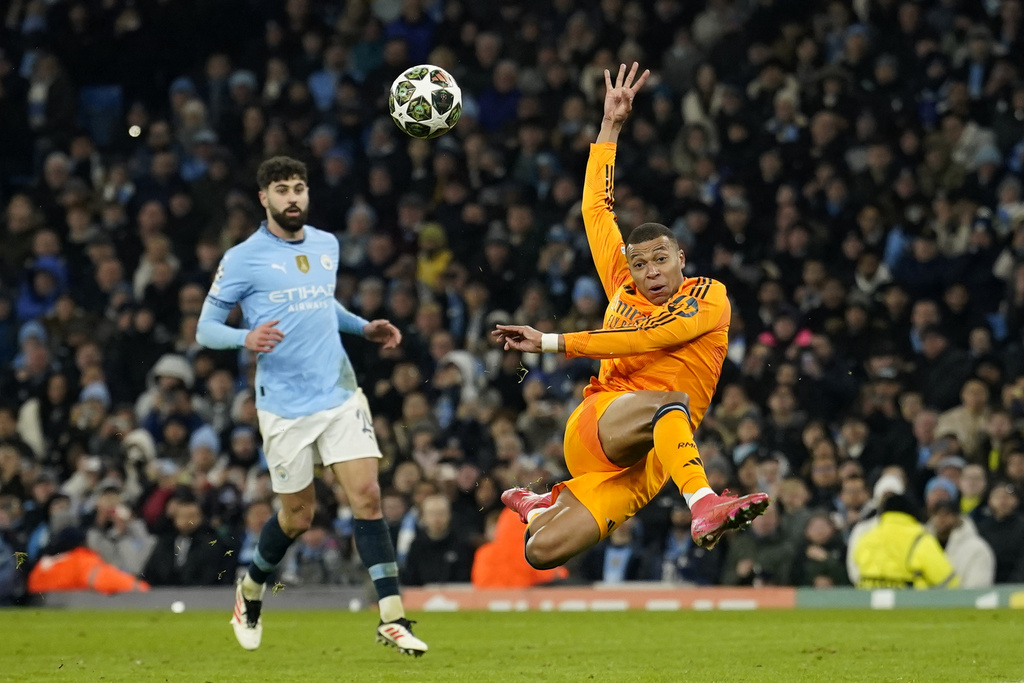The timeline of odds for the Man City vs Real Madrid clash shows how betting odds changed during the game.
On 11 February 2025, Manchester City hosted Real Madrid at the Etihad Stadium in the first leg of the Champions League knockout‑playoff round.
The home side began strongly and in the 19th minute, Erling Haaland opened the scoring with a well‑placed volley after a build‑up down the flank.
City held that lead into half‑time and looked in control, combining possession with high tempo attacks.
Early in the second half Real Madrid responded. In the 60th minute Kylian Mbappé equalised with a looping strike from a free‑kick rebound, bringing the visitors level.
City regained the lead in the 80th minute when Haaland converted a penalty after a foul inside the box, putting the score at 2‑1 in favour of the hosts.
However, Real Madrid were far from done. In the 86th minute Brahim Díaz pounced on a poor clearance and slotted home to make it 2‑2.
Then, in stoppage time at 90+2 minutes, Jude Bellingham scored the winner after a defensive error, completing a dramatic turnaround for Real to win 3‑2 away.
One week later, on 19 February 2025, the second leg was played at the Santiago Bernabéu. Real Madrid won 3‑1, meaning they progressed with a 6‑3 aggregate victory and eliminated Manchester City from the competition.
How the Man City vs Real Madrid Timeline & Betting Odds Changed
Pre‑match Odds
Before kick‑off, Manchester City were heavy favourites. Their strong home record in Europe and squad depth made them the likely winners in most bookmaker markets. Real Madrid, despite their pedigree, were considered slight underdogs away at City.
In‑Play Shifts as the Match Progressed
When City scored in the 19th minute, the odds for a City win shortened further — bettors backing City felt comfortable, and the implied probability of a City victory increased. Conversely, Real Madrid’s odds lengthened.
When Mbappé equalised at 60 minutes to make it 1‑1, the market shifted. City’s odds began to drift (i.e., increase numerically in decimal, implying a lower probability), while Real’s odds improved as their chances rose.
City’s penalty goal at 80 minutes to go 2‑1 up triggered another swing. The market again tightened for City — their implied chance of winning went up, Real’s odds went out. But there remained risk.
Real Madrid’s goal at 86 minutes to make it 2‑2 produced a pronounced shift: City’s win odds lengthened significantly, Real’s odds shortened, and the draw scenario also became more favourable.
Finally, Bellingham’s winner at 90+2 minutes closed the game. Many live bets would have already reacted, and the final whistle confirmed the upset. The betting markets had to adjust rapidly as momentum swung away from City in the dying minutes.
Post‑match & Aggregate Context
With Real ahead 3‑2 after the first leg, betting markets for the second leg flipped: Real Madrid became favourites to progress, City became underdogs. After the 3‑1 win in the second leg, the aggregate 6‑3 made the progression comfortable for Real, validating how live odds had moved with the tie.
Why the Odds Reacted the Way They Did
Several key factors explain the market behaviour:
- Pre‑match expectation: City at home in a knockout tie had natural edge, so their odds were short.
- Early goal: City scoring early reinforced their favourite status, mentally boosting bettors.
- Momentum swings: Real equalising and then scoring twice late triggered sharp odds moves — live markets respond fast to goals, especially late ones.
- Venue & format: Knock‑out tie, both legs matter; the first leg went favourably to Real, changing second‑leg pricing.
- In‑play behaviour: Many bettors engage mid‑match; bookmakers adjust in real time to scoring events, substitutions, injuries, dominance shifts.
Match & Market Lessons
This tie offers multiple insights:
- Even heavy favourites can lose — City’s home advantage and early lead weren’t enough.
- Live betting markets are dynamic — odds can change significantly in minutes when key events happen (goals, penalties, mistakes).
- Timing matters — betting before a goal or reacting quickly after can find value.
- The psychological dimension of sport (late goals, defensive errors, momentum collapse) has direct market impact.
- For teams: Real Madrid showed resilience and ability to finish strongly; City will reflect on the late conceded goals and how leads were lost.
- For bettors: Pre‑match analysis is important, but so is in‑play sense of when markets might mis‑price momentum shifts.







